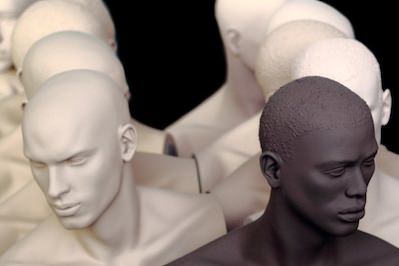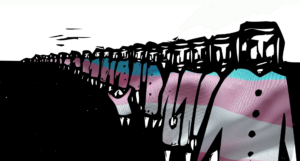Truthdigger of the Week: Leslie Feinberg
The obituary of the pioneering transgender activist and author of the award-winning 1993 novel Stone Butch Blues reads like a biography of the instinct for justice. Photo by DryHundredFear (CC BY 2.0)
Photo by DryHundredFear (CC BY 2.0)
Photo by DryHundredFear (CC BY 2.0)
Every week the Truthdig editorial staff selects a Truthdigger of the Week, a group or person worthy of recognition for speaking truth to power, breaking the story or blowing the whistle. It is not a lifetime achievement award. Rather, we’re looking for newsmakers whose actions in a given week are worth celebrating.
Leslie Feinberg, a pioneering author and activist who represented the experience of transgendered people in contemporary society, died Nov. 15 at her home in Syracuse, N.Y. The cause was complications from multiple tick-borne infections (including Lyme disease) from which she suffered for decades. In the U.S. where she lived and worked, up to 1 percent of the population is thought to be transsexual, meaning that they do not identify with the gender assigned to them at birth. (The number of transgender people is thought to be much higher.)
An obituary written by Feinberg’s partner of 22 years and eventual spouse — author, activist and poet Minnie Bruce Pratt — and published at the lesbian, gay, bisexual and transgendered news and information website Advocate.com, gives readers a sense of the facts and significance of Feinberg’s life. Feinberg’s working-class family is said to have rejected her when she began exploring the gay bar scene as a teenager in her native Buffalo, N.Y. From this point on, the discrimination she faced as an openly transgender person (meaning anyone who dresses, talks or otherwise behaves differently from what a majority of people would expect given their apparent gender) “made it impossible” to get steady work. (A majority of U.S. states grant employers the right to fire someone for being transgender.) She supported herself with a series of low-wage temporary jobs, including as a dishwasher, an American sign language interpreter and a cleaner of ship cargo holds, as well as inside a PVC pipe factory and a book bindery. In her early 20s she encountered the communist World Workers Party at a demonstration for Palestinian rights and joined the group’s New York chapter.
After moving to New York City for what would be 35 years, she participated over the years in numerous anti-war and pro-labor campaigns organized by the WWP. In the early 1980s she toured nationally in an effort to get AIDS recognized as an epidemic. Almost a decade earlier she was a key organizer of a “March Against Racism” in Boston, during which she led a group of 10 lesbians on a night long “paste up” of racist messages visible throughout the city. White supremacists had been attacking African American children and adults throughout the city. in 1988 she organized an action that prevented the Ku Klux Klan from marching down Atlanta’s Martin Luther King Jr. Ave. on Martin Luther King Day. On numerous other occasions she organized what Pratt describes as “community self-defense for local LGBTQ+ bars and clubs as well as the women’s clinic.”
For more than a decade Feinberg worked as a journalist, editor and then managing editor for the Workers World Party newspaper and became a member of the party’s National Committee. From 2004 to 2008, her 120-part column on socialism and LGBT history, “Lavender & Red,” ran in the newspaper. She published “Stone Butch Blues,” an award-winning 1993 novel regarded as having driven gender issues hard into the mainstream of American culture. It was translated into at least seven languages and sold hundreds of thousands of copies (and will be available for a free download online in the 20th anniversary edition Feinberg worked on until a few days before her death). Feinberg also wrote a second novel and four works of reporting and essays. Within and outside of her efforts to develop a Marxist theory of “transgender liberation,” Feinberg’s commitment to communism appears to have been absolute. Pratt reports that the last words Feinberg uttered before dying in bed were: “Remember me as a revolutionary communist.” In addition to that label she identified as an “anti-racist white, working-class, secular Jewish, transgender, lesbian, female.” She respected the effects that the use of a wrong gender pronoun could have on people who felt it did not apply to them. She preferred to go by “she/zie” and “her/hir” herself, but according to Pratt, seemed to be understanding when a person innocently used the wrong pronoun, without intending disrespect or harm.
Feinberg’s other affiliations included the National Writers Union, Local 1981, and Pride at Work, an AFL-CIO constituency group. For her transgender and social justice work she held an honorary doctorate from the Starr King School for the Ministry, and received numerous other awards including, Pratt writes, the Lambda Literary Award and the American Library Association Gay and Lesbian Book Award.
Later in life her illnesses prevented Feinberg from writing, and at times even reading and talking. This development prompted her to take up photography on the popular photo-sharing website Flickr. There, among thousands of pictures, she published her “Screened-In Series,” a documentary of her neighborhood in Syracuse photographed entirely from behind the windows of her apartment. In the introduction to her Flickr page, she refers to two other debilitations, both of which occurred in childhood: the loss of use of her left hand, and perhaps more mysteriously, the loss of her ability to close her eyes and picture anything in her mind. The photos that appear on Flickr serve as “a kind of geographic and emotional GPS of where I was and how I got here,” she writes.
Before she died, she regarded “bigotry , prejudice and lack of science” as the causes of her catastrophic health. Pratt described these as “active prejudice toward her transgender identity that made access to health care exceedingly difficult, and lack of science in limits placed by mainstream medical authorities on information, treatment, and research about Lyme and its co-infections.” Feinberg wrote about these issues online in her blog series “Casualty of an Undeclared War.” Friends of hers will continue to curate her work at her website.
Like so many people whose nature, behavior and lifestyles fall outside the definitions of the mass culture, Feinberg lived a life of pointless opposition — pointless not in terms of her struggle, but in the moral and practical harm society inflicts upon itself by excluding her and people like her; by turning them into aggrieved “others.” Those of us who are in some way different speak up about it at great risk. But if we do not, then we lose the insight that is necessary to create a society where all people — for example: whomever, reader, your unborn son or daughter might be — have a place to live in peace, comfort, happiness — and sure, productivity. Feinberg honored her identity and the human race by speaking out, and we are all of us richer for it. She is our Truthdigger of the Week.
Your support matters…Independent journalism is under threat and overshadowed by heavily funded mainstream media.
You can help level the playing field. Become a member.
Your tax-deductible contribution keeps us digging beneath the headlines to give you thought-provoking, investigative reporting and analysis that unearths what's really happening- without compromise.
Give today to support our courageous, independent journalists.









You need to be a supporter to comment.
There are currently no responses to this article.
Be the first to respond.